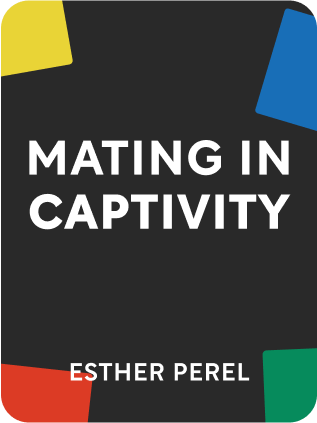

This article is an excerpt from the Shortform book guide to "Mating in Captivity" by Esther Perel. Shortform has the world's best summaries and analyses of books you should be reading.
Like this article? Sign up for a free trial here .
When does sexuality start to develop? How does childhood influence our sexual relationships in adulthood?
Human sexuality begins to develop very early in childhood, way earlier than we start expressing interest in sex. Our childhood experiences influence our adult relationships in three primary ways: how we’ve learned to balance dependence and independence, how we view sexuality, and how gender norms affect our sexuality.
In this article, we’ll discuss the role of early childhood experiences in sexuality development.
Childhood and Sexuality
What we experience in childhood we carry forward into our adult relationships, and some of what we learned we may not even be aware of. The body as well as the mind stores memories, both good and bad, and they play a significant role in our development of sexuality.
Example #1: Steven’s father left his mother. Steven admires and respects his mother and doesn’t want to be anything like his father. He married Rita and six years later finds it hard to have sex with her. Because of his relationship with his mom (love and respect), he learned that emotional security requires caution and selflessness. Caution and selflessness are the opposite of desire-driving emotions such as passion and longing.
Example #2: Dylan’s mother died when he was twelve and when he started to cry at her funeral, his father told him not to be weak. Dylan learned that feelings were shameful, and that he should never show or even feel them. This manifests in his relationships—he picks up strangers at clubs, because there are no feelings in anonymous sex.
Dependence vs. Independence
As children, we’re constantly dealing with the dichotomy of dependence and independence from our parents. We’ll do anything not to lose the parent-child bond, including a wide range of behaviors such as taking blame and minimizing our needs. However, we also want and need independence. We learn balance based on how our parents react to our attempts to connect with them or test our autonomy, and whether we interpret those reactions as suffocating, intrusive, permissive, or detached.
Dependence and independence are a dichotomy in adulthood too, with our partners. To have sex, we have to be able to enter another’s universe or body. However, we also have to be so aware of ourselves—so selfish—that the other disappears. The ability to temporarily “leave” someone comes from childhood experiences. If we’ve learned that the connection we have with someone doesn’t break the moment we stop monitoring it, we can believe that after we’ve finished focusing on ourselves, the other person will still be there when we come back.
It’s possible to balance dependence and independence emotionally but fail to do so physically. Sex is quite literally two becoming one, and losing the sense of self can be so off-putting that people can’t handle it.
Views on Sexuality
In addition to teaching us about relationships and the balance between dependence and independence, our parents can much more directly shape our sexuality. If our parents treat sex as something dirty or shameful, we associate those feelings with sex too. If they teach us we must be a certain way in a relationship, we hold onto this. Additionally, what hurts us as children can often be what excites as most in our adult sexuality (desire is irrational).
Example #1: Lena grew up in a conservative, devout household that held women to traditional values. Lena became a giver, and she puts the needs of her partner above her own.
Example #2: Melinda’s father was a philanderer, which made her mother miserable. Melinda grew up to be a seductress and for her, desire is related to establishing power over men. Seducing unavailable men is a gender-swapped version of what Melinda’s father did to her mother.
Gender Generalizations
We’re introduced to gender stereotypes early in life, from the colors of our clothes to how we’re taught to socialize. By the time we reach adulthood, it’s possible to make a few generalizations about how each gender approaches sex.
Women commonly make their sexual identity about how their partner feels about and desires them. Women sometimes have trouble owning their sexuality.
Male desire has two extremes (debatably):
- Those who want their partner seek them out sexually to confirm that they’re desirable.
- Those who don’t like it when their partner initiates because they think their passivity isn’t masculine enough.
Extended Example: James and Stella
When James was a child, his mother relied on him rather than her husband for support, and James always found it hard to balance pleasing his mother and living his own independent life. This childhood relationship influenced his adult relationship with his wife, Stella. Though Stella and James’s mother are very different—Stella dislikes James’s attempts to be responsible for her and doesn’t like to be smothered—James still experiences the same tension between dependence and independence that he experienced with his mother. James feels he can’t have independence, which is selfish, without hurting someone. In his relationship with Stella, this translates to him being so concerned about maintaining his erection that Stella feels like he’s not even focusing on her, even though she’s the whole reason he’s trying. James finds sex so stressful he avoids it.
Stella has been in charge of their sex life throughout the whole relationship, which she doesn’t like, but she does because she feels like if she doesn’t take charge, he won’t. When Stella hits menopause and her sex drive decreases, she discovers she’s right—now that she’s not initiating things, they’re not happening.
James is only able to experience anxiety-free sex alone. He’s not being selfish if he’s not with someone. The author suggests he experiment with masturbating next to Stella, which might allow him to be self-centered and realize that it doesn’t hurt her. This might also help differentiate James’s relationship with Stella from the one with his mother, because he never would have masturbated next to his mother.
Stella and James experiment, but they have a more important experience on their own. Stella is upset and James’s impulse is to hold her. James isn’t sure this is what she wants, but he pushes himself to hold her, even when she doesn’t respond right away. For the first time, James didn’t take his cue from Stella, and taking control allowed him to lose control.

———End of Preview———
Like what you just read? Read the rest of the world's best book summary and analysis of Esther Perel's "Mating in Captivity" at Shortform .
Here's what you'll find in our full Mating in Captivity summary :
- Why it's difficult to have a good, erotic life within a long-term relationship
- What makes up our individual sense of desire and our desire for our partners
- Tips on how to retain desire in a committed relationship






